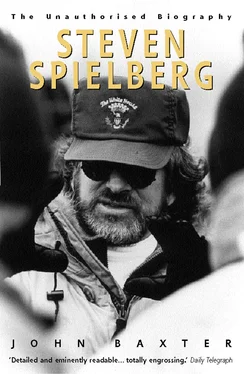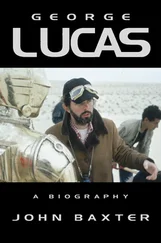The automobile, its pleasures and dangers, was, even more than usual, a national preoccupation. GM recalled 6.7 million Chevrolet cars and trucks and Ford 220,000 Pintos to correct design faults. Two Detroit car novels, Arthur Hailey’s Wheels and Harold Robbins’ The Betsy , were the year’s big sellers. They were matched only by William Peter Blatty’s The Exorcist and Tom Tryon’s The Other , occult thrillers with suburban or rural settings that probed the unease about daily life bedded as deep in the mouth of America as an abscessed tooth.
Dennis Hoffman, the producer of Amblin’ , kept asking what had happened to his film. Spielberg was directing and McMyler had a small role in The Boston Stranger . But he, the man who’d given them their chance, whose name was on Amblin’ , who’d put up the money, had zilch. The Universal short subjects department finally offered $90,000 for the rights. ‘But the sex and the joint have gotta go,’ they said. ‘This is a family company.’ Indignantly, Hoffman refused, and Spielberg, while not making an issue of it, backed him up. Amblin’ had served its purpose in getting him into the studio. What happened to it now didn’t matter that much. Retrieving the film from Universal, Hoffman sold it to Paramount, which released it late in 1970 as the support film to what looked like a cheap youth picture. But Love Story , Arthur Hiller’s adaptation of Erich Segal’s best-seller, with its tearful celebration of young love on its deathbed, became the year’s sleeper, making stars of Ryan O’Neal and Ali McGraw, and grossing more than $100 million. Everywhere, people stopped Spielberg and said, ‘Say, I saw that movie of yours.’ He wasn’t any longer just some nephew or cousin of Sid Sheinberg’s who had almost fucked up the Joan Crawford TV pilot. Something of his had made it to the Big Silver. He was a movie director.
All over Hollywood, young directors had become hot in the wake of Dennis Hopper and Peter Fonda’s hymn to dope, rock and the road, Easy Rider. Variety’s 1970 Cannes Festival report acclaimed American cinema as ‘the new avant garde’ , while 1971’s International Film Guide rated it
more innovative, more directly concerned with issues, and more deeply expressive of individual personal vision. Features like Alice’s Restaurant, The Strawberry Statement, Woodstock … as well as hundreds of lesser known independent films, reject traditional romantic clichés and get very close to the bizarre configurations of contemporary American experience.
Old Hollywood didn’t know what to make of this unexpected new direction in the industry. ‘In those times,’ says Michael Pye, ‘there was just this moment when it was possible for a whole generation of young talent to come in and make very much the films they wanted, because no one was any longer very sure what sort of film a studio product would be.’
Overnight, directors fresh from film school had their fantasies funded by an industry hipped on being hip. ‘Every studio in town was narcotised by Easy Rider’s grosses,’ wrote the novelist Joan Didion, a devoted Hollywood-watcher and occasional screenwriter, ‘and all that was needed to get a picture off the ground was the suggestion of a $750,000 budget, a low-cost NABET or even a non-union crew, and this terrific twenty-two-year-old director.’
The 1970/71 releases included a score of first or early films by directors of Spielberg’s generation: Glenn and Randa (Jim McBride), Getting Straight (Richard Rush), Cover Me, Babe (Noel Black), Watermelon Man (Melvin van Peebles), Up in the Cellar (Theodore J. Flicker). A few of the newcomers were his friends: John Korty ( Riverrun ) and Brian De Palma ( Hi, Mom! ).
At Universal, however, the revolution was a long time coming. Never one for quick decisions, Lew Wasserman rode out the first youth wave by ignoring it. As far as he was concerned, Universal was mainly in the TV business. In 1971, however, he appointed Ned Tanen, a producer from the music business with no particular qualifications except his relative youth, to acquire low-budget ‘alternative’ projects. By early 1972 Tanen had bought Monte Hellman’s Two Lane Blacktop , Frank Perry’s Diary of a Mad Housewife and John Cassavetes’ Minnie and Moskowitz .
Everyone Spielberg knew seemed to have a feature deal. As he bounced around Hollywood, from the campus of USC for a screening of student films to a Preston Sturges retrospective in Santa Monica, over a roast beef sandwich at Musso and Frank’s or at a party at Coppola’s place, the stories kept coming. Phone calls from producers who’d unearthed some long-forgotten script and wanted to discuss it, offers from Metro or Fox to ‘come in and talk a deal’.
Milius sent him his latest screenplay. The Life and Times of Judge Roy Bean , which he’d just sold to John Huston. It was an epic western – the sort of script that Howard Hawks or John Ford might have made. When The Godfather opened in March 1972, its baroque, Continental richness drowned him in darkness thick as chocolate sauce. That such films could be made in Hollywood was incredible!
Coppola, with William Friedkin and Peter Bogdanovich, had launched The Directors’ Company. It was a Renaissance gesture, an alliance of princes. They pledged to share in each other’s profits and never to concede final cut to anyone. Old Hollywood smirked. They’d seen these groups before. They came and they went. Sooner or later they’d start bickering. One or another of them would do better than the rest. Someone would screw someone else’s wife… It was an old story.
Spielberg watched these evolutions with alarm. Reputations were being made before his eyes. Fame was being conferred. People were becoming immortal. And he was directing The Psychiatrist ! He would have jumped at anything Ned Tanen offered him, but there could be no rapprochement between the eager Spielberg and this moody executive with his permanent sneer, his dour pleasure in the deal, and his belief that Hollywood was characterised by ‘negativity and illusion – especially negativity’. While Tanen was in charge, Spielberg didn’t have a chance. It drove him crazy. ‘The truth is,’ said a friend, ‘Steve would have made anything that got him into features.’
Spielberg says he first came across Richard Matheson’s short story ‘Duel’ when his secretary Nora Tyson, with a blush about even knowing what was inside the world’s most successful men’s magazine, showed him the April 1971 Playboy containing the story, in which a lone motorist is pursued by a homicidal truck driver in a gas tanker. Matheson doesn’t agree. He’d written the film script long before he and Spielberg met. He based it on an incident when a truck driver tried to bump him off the road near his San Fernando Valley home, a common enough event on an increasingly congested system of which the trucker, like the bikers of Easy Rider , regarded himself as a sort of cowboy hero, subject only to his own rules. Its hero, Dave Mann, an archetypal corporate cipher with a house in the suburbs, a wife and two children, sets out on a trip to save an important account. Cutting across country, he overtakes a fume-belching gas tanker, the driver of which regards this as an insult. With mounting violence, he pursues him across the Sierra until they crash together into a quarry. Only Dave, a better Mann for the experience, survives.
In a more probable, if less heart-warming, alternative version of the legend about how Spielberg encountered Duel , a pal in the mailroom, part of his carefully nurtured network, funnelled him an interesting screenplay already going the rounds of producers. However he came across it, Spielberg devoured Duel with the enthusiasm of a fan. Matheson had written a number of Twilight Zone episodes – and the original of The Incredible Shrinking Man .
Читать дальше












